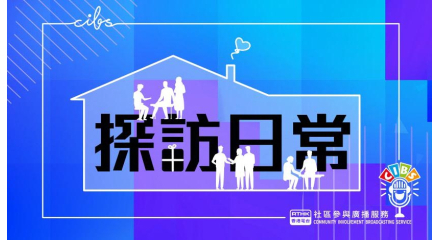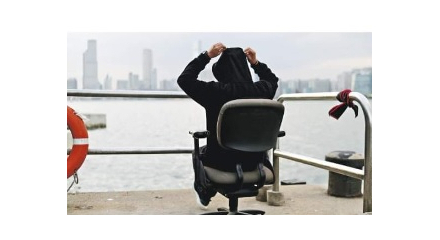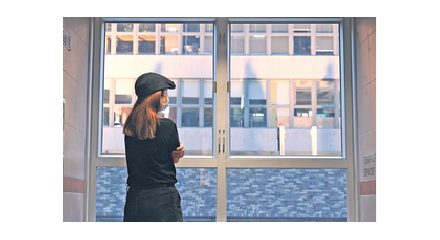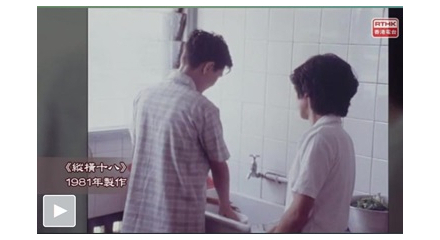Related News

NGO female leader's sharing and pep talk
2022.3.8
Women's rights and interests have attracted attention in recent years. In many countries and regions nowadays, women seem to enjoy the right as men, still, gender stereotypes happen. For example, men have higher ability to work, women are emotional and could make mistakes, women need to spend time taking care of their families and thus spend less time on work, etc.
Ms. Anthea Lee, CE of SRACP accepted the interview by HK01 earlier to express her view and experience as a female NGO leader, on how to face difficulties, adjust the mentality and lead the Society amid the epidemic.
To learn more details, please click below link (only Chinese Version):
Detail

Volunteers bring warmth and hope to inmates
2022.2.28
Mrs Pang has participated in the prison-visiting volunteer service of SRACP for many years, assisting the family members of inmates in visiting their families in prison. Mrs Pang escorts the young children from foster families to see their parents in correctional institutions. She also visits inmates on behalf of the elderlies with limited mobility. Mrs Pang shared a profound experience. She learnt from the foster family that the 8-year-old child experience insomnia the night before each visit and avoid conversations about her family when facing strangers, who hug her guardian at the foster family and cry bitterly after visit every time. Mrs Pang also shared her experience and skills to soothe the emotions during prison-visiting.
Detail

Give a chance to the younger generation
2022.1.17
In response to the invitation of SRACP, Prof. Yip Siu-fai, Director of the Hong Kong Jockey Club Suicide Prevention Research Center of the University of Hong Kong, hired four undergraduate students who were sentenced to rehabilitation centers due to social incidents as research assistants since last summer vacation.
To learn more details, please click below link (only Chinese Version):
Detail

Single mom who quit drugs and started a beauty business for her beloved daughter
2022.1.12
Emily was exposed to drugs for fun at the beginning of secondary school, and then became more addicted, and took drugs for four to five years. After she became pregnant at the age of 19, she finally got rid of drug addiction in order for her daughter to grow up healthily. Faced with marital problems, Emily suffered from mild depression. After the divorce, she actively worked for her daughter and became a working single parent. With the support of her family, she participated in the “Hang Seng Youth Career Planning Scheme” implemented by SRACP and Hang Seng Bank to start a business from scratch and build her own beauty business. Now, she is the owner of a beauty online store. Her goal is to give her daughter a better life, and she also strives to share her experiences to inspire others.
Detail

Rotary District 3450 Advocate rehabilitation persons to integrate back into the society
2021.12.31
Seven Rotary Clubs of the 8th Region of Rotary International District 3450 work closely with each other to provide help and opportunities for the neglected disadvantaged groups. Among them, the Rotary E-Club of Tamar Hong Kong and Rotary Club of Central Harbourfront have cooperated with SRACP to launch different programmes and activities in the past years, including the "Healthy Cook Competition", STEM workshops and technology-related competitions, as well as stress-relieving workshops including aromatherapy massage and bonsai making, etc., to encourage rehabilitated people meet new friends and networks, and support the stress of caregivers and inspire young people.
To learn more about Rotary's work, please click below link (only Chinese Version):
Detail

Hang Seng Youth Career Planning Scheme – “Tailor Made Your Future Weekend Bazaar” Concluded with a Great Success
2021.11.28
Organised by The Society of Rehabilitation and Crime Prevention, Hong Kong and supported by Hang Seng Bank, the “Hang Seng Youth Career Planning Scheme” (“the Scheme”) strives to respond to the learning needs of the youths. The Scheme aims to establish an experiential out of the school learning platform for the youths-in-need, to explore the current situation and development of different industries according to the interests and abilities of youths.
In order to help the youths start up their businesses, the Scheme held a two-day event “Tailor Made Your Future Weekend Bazaar” in November 2021, which drew more than 1,000 visitors over two days. Thirty young stall owners practiced their entrepreneurial dreams and successfully exhibited their entrepreneurial achievements, including hand-made ornaments, tea products, local plantation and Italian ingredients.
Detail

Promote Persons in Recovery to Reintegrate into Society
2021.11.26
It is not easy for people who are persons in recovery (PIR) to reintegrate into society and return to work environment, especially if they have a criminal background. The RTHK TV programme "Flash Hong Kong (快閃香港)" relives the old Hong Kong through old clips and preview the future development. The latest series will explore the evolution of mental health services in Hong Kong. One of the episodes mentioned the SRACP Employment Development Services which provide vocational training for rehabilitated persons suffering from mental illness to help them reintegrate into society.
Detail

Start Anew Through Dramas
2021.10.28
"STAR Theatre” is an opera troupe that allows rehabilitated people to speak out and explore their potentials. Through its performances, the personal experience of rehabilitated people is transformed into an educational life story, thereby illuminating themselves and others.
Ms. Anthea Lee, Chief Executive of SRACP, and 阿珺, a troupe member, accepted an interviewed with Metro Broadcast programme to share the challenges faced by rehabilitated people with drug abuse backgrounds, and how to make well use of drama for rehabilitation. These dramas were adapted from real stories of SRACP service users, by playing a role in the stories, the actors review again their life and strengthen the rehabilitation and recovery. Meanwhile, the public would have higher acceptance and understanding towards the ex-offenders by watching the drama performances, which help to create a more inclusive society.
Detail

Rehabilitated offender starts anew to be an entrepreneur
2021.9.18
Wah was released from prison after serving a 20-years sentence. He successfully rehabilitated and started his own cleaning company in his mid-forties, and he insisted on employing ex-offenders to help them break the cycle and restore a healthy life. Now, he enters his sixtieth year and still continues to support rehabilitees.
The 70-year-old service user, Uncle Wing, has recently worked as an intern in Wah's company, showing rehabilitated silver-haired groups could give full play to their abilities.
Mr Ronald Szeto, Assistant Manager of Employment Development Services of the Society, Wah and Uncle Wing were interviewed by TVB programme "無耆不有". They shared views on the challenges on returning to the workplace for older rehabilitated persons and our employment training support services to eliminate stigma against rehabilitated persons.
Detail
